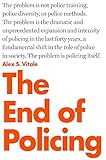The end of policing / Alex Vitale.
Material type: TextPublisher: London ; New York : Verso, 2017Description: 266 pages ; 22 cmContent type:
TextPublisher: London ; New York : Verso, 2017Description: 266 pages ; 22 cmContent type: - text
- unmediated
- volume
- 9781784782894 (hardback)
- 363.20973 23
- HV8139 .V58 2017
- POL014000 | SOC031000 | POL028000
| Item type | Current library | Collection | Call number | Copy number | Status | Barcode | |
|---|---|---|---|---|---|---|---|
 Books
Books
|
Rabdan Academy General Stacks | Non-fiction | HV8139 .V58 2017 (Browse shelf(Opens below)) | 1 | Available | 158727 |
Browsing Rabdan Academy shelves,Shelving location: General Stacks,Collection: Non-fiction Close shelf browser (Hides shelf browser)

|

|

|

|

|

|

|
||
| HV8138 .C672 2011 Police ethics : the corruption of noble cause / | HV8139 .S32 2014 Introduction to policing / | HV8139 .S32 2014 Introduction to policing / | HV8139 .V58 2017 The end of policing / | HV 8141 .B68 2010 Problem- Oriented Policing and Crime Prevention | HV8141 .F47 2017 The rise of big data policing : | HV8141 .H29 2014 Crisis intervention: the criminal justice response to chaos, mayhem, and disorder / |
Includes bibliographical references and index.
"How the police endanger us and why we need to find an alternative Recent years have seen an explosion of protest and concern about police brutality and repression--especially after long-held grievances in Ferguson, Missouri, erupted in months of violent protest following the police killing of Brown. Much of the conversation has focused on calls for enhancing police accountability, increasing police diversity, improving police training, and emphasizing community policing. Unfortunately, none of these is likely to produce results, because they fail to get at the core of the problem. The problem is policing itself--the dramatic expansion of the police role over the last forty years. This book attempts to jog public discussion of policing by revealing the tainted origins of modern policing as a tool of social control and demonstrating how the expanded role of the police is inconsistent with community empowerment, social justice--even public safety. Drawing on first-hand research from across the globe, Alex Vitale shows how the implementation of alternatives to policing, like drug legalization, regulation, and harm reduction instead of the policing of drugs, has led to reductions in crime, spending, and injustice"-- Provided by publisher.
"Recent years have seen an explosion of protest and concern about police brutality and repression--especially after long-held grievances in Ferguson, Missouri, erupted in months of violent protest following the police killing of Brown. Much of the conversation has focused on calls for enhancing police accountability, increasing police diversity, improving police training, and emphasizing community policing. Unfortunately, none of these is likely to produce results, because they fail to get at the core of the problem. The problem is policing itself--the dramatic expansion of the police role over the last forty years. This book attempts to jog public discussion of policing by revealing the tainted origins of modern policing as a tool of social control and demonstrating how the expanded role of the police is inconsistent with community empowerment, social justice--even public safety. Drawing on first-hand research from across the globe, Alex Vitale shows how the implementation of alternatives to policing, like drug legalization, regulation, and harm reduction instead of the policing of drugs, has led to reductions in crime, spending, and injustice"-- Provided by publisher.
There are no comments on this title.
